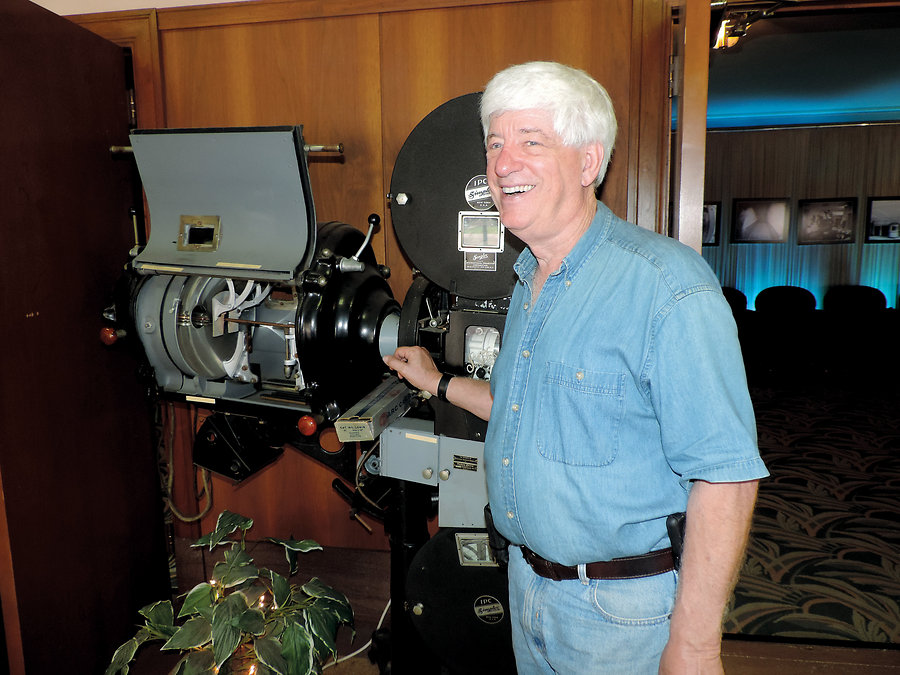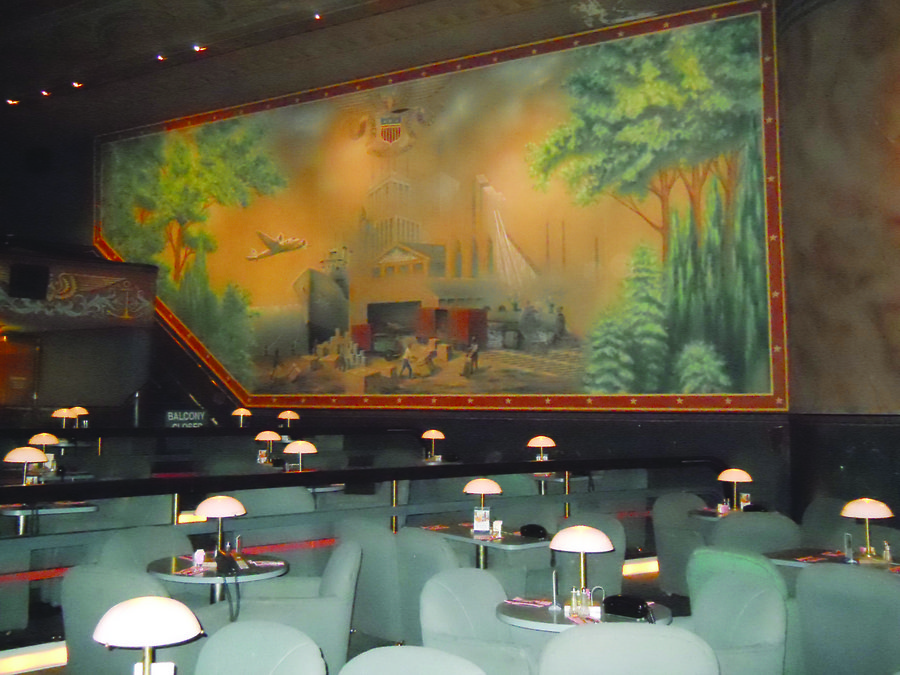 THE COMMODORE THEATRE'S FRED SCHOENFELD Preparing for the future by uncovering the past by Rob Lauer The historic Commodore Theatre is the perfect venue in which to experience an epic action-adventure film such Raiders of the Lost Ark or Indiana Jones and the Temple of Doom. The theatre's THX and Dolby Digital sound system would make the adventures of filmdom's favorite archeologist leap off of its mammoth 41-foot screen. "Restoring the Commodore made me feel like an archeologist," owner Fred Schoenfeld recalls. "To work at restoring an historic building was a true-life adventure. To go into a place, and learn how people did things in the past is so exciting! Growing up, I was bored with history in school, but touching something from the past, being inside an historic structure- that makes history come alive! The restoration process is constantly filled with "Oh-my-gosh' moments." Such moments were plentiful during the restoration of the Commodore. Exploring parts of the theatre that had been sealed off for over 40 years, and coming face-to-face with the technology used in its construction, gave Fred new insights into the past. "Movie theatres are a uniquely American creation. We still have more historic movie theatres in our country than anywhere else on earth, but many were torn down and replaced with multiplex theatres. Single-screen theatres are things of the past." - Fred Schoenfeld "This theatre was built 70 years ago- when theatres were built to last for centuries," he explains. "Movie theatres are a uniquely American creation. We still have more historic movie theatres in our country than anywhere else on earth, but many were torn down and replaced with multiplex theatres. Single-screen theatres are things of the past." Besides the Commodore, another such single-screen theatre, built during the Golden Age of Hollywood, still stands in Portsmouth, though it is currently a mere shadow of its former-self. That theatre- the Afton- is located in Cradock's historic Afton Square. "Cradock is celebrating its 100th anniversary this year," Fred says. It was the nation's first Federally-built community- built to house shipyard employees and their families during World War I. Back then, the Norfolk Naval Shipyard was desperate for workers, but there wasn't enough housing in Portsmouth to accommodate everyone. Cradock was built by the government to be a self-sufficient community. There was a shopping district in its center, built around a park area with an old-fashioned band stand for community performances." The Afton Theatre is situated on the square, directly across the street from the park- which has been restored in recent years. However, at the present, the theatre is in desperate need of repair. Nevertheless, Fred sees tremendous potential in the building. His vision is to restore the theatre to its former glory- just as he did with the Commodore. But whereas the Commodore was a for-profit commercial venture, Fred envisions a restored Afton Theatre as a non-profit entity with a twofold mission.  Restoring the Commodore made Fred Schoenfeld feel like an archeologist. In restoring Craddock’s Afton Theatre, he hopes to train others to work in the field of historic preservation. "Step one would be to involve young people in the restoration of the theatre so that they would not only learn the value of historical restorations, but also be educated in the process that's required," Fred explains. "Bringing the Afton back to life would be used as a teaching tool. Those involved would learn how to analyze an older property, and determine what steps are needed to bring it up to code. Being an engineer myself, I would use the restoration process to teach the trades and the elements of construction to anyone who wants to learn them." "Once the Afton Theatre has been restored to the way it was in the 1930s, movies would be shown and food would be served there, the same as the Commodore," Fred continues." But in addition, the theatre would be used for small concerts, lectures and other events. Because it's located in an historic residential area, it could become a center piece of the community- just as it was originally. At that stage of the game, the second part of our mission would kick-in. We would then offer young people career training in such things as theatrical management, food service and related trades. One can take community college courses, but we would offer intern positions through which people would be educated on the job, and earn a certificate. Because this would be a non-profit setup, all money made would be funneled back into maintaining the theatre and the program." To bring this vision to life, Fred has founded a non-profit organization- Portsmouth Restoration and Education Corporation- to restore the Afton. Still, the organization faces some major hurdles. "The problem with a non-profit is that you have to raise money," Fred says with a laugh. "At least we had a viable building when we restored the Commodore, but with the Afton Theatre, all that's left are the walls and the floor. Replacing the roof alone will cost $100,000. We can do it; we just need help. If anyone wants to make a donation, we'll accept it," he adds with a grin. To offset the cost of historical restorations, individuals and organizations undertaking such projects rely on the tax-cuts that are given when a property has been officially listed on the National Register of Historic Places and the Virginia Landmarks Register. "Cradock received historic status for those buildings constructed between 1918 and 1923- the years officially designated as the period of significance," Fred explains. "The problem is that the Afton Theatre was built in 1937- after the period of significance. So, there are no tax cuts available for restoring it. The bottom line is we have to come up with historic designation for the Afton, and secure funds for its restoration." Fred and his partner, Tiffany Brown, are the Commodore's sole full-time employees. Living only two blocks away in Portsmouth's historic Olde Towne, they are virtually on-call 24 hours a day. "If it needs doing around here, I have to do it," Fred says, shaking his head and laughing. "That leaves very little time for Portsmouth Restoration and Education Corporation. We need volunteers who have experience, or an interest, in grant writing and fundraising. So, if someone is excited by our vision for the Afton Theatre and wants to get involved, just give us a call at the Commodore." Passionate about preserving the past, Fred is looking for like-minded souls to join him in the effort. The work might not involve the death-defying antics of an Indiana Jones film, but Fred is convinced that it will be an unforgettable adventure.  One of the Commodore’s beautifully restored murals. The non-profit Portsmouth Restoration and Education Corporation has been founded to similarly restore the Afton Theatre in Portsmouth’s historic Craddock area. |